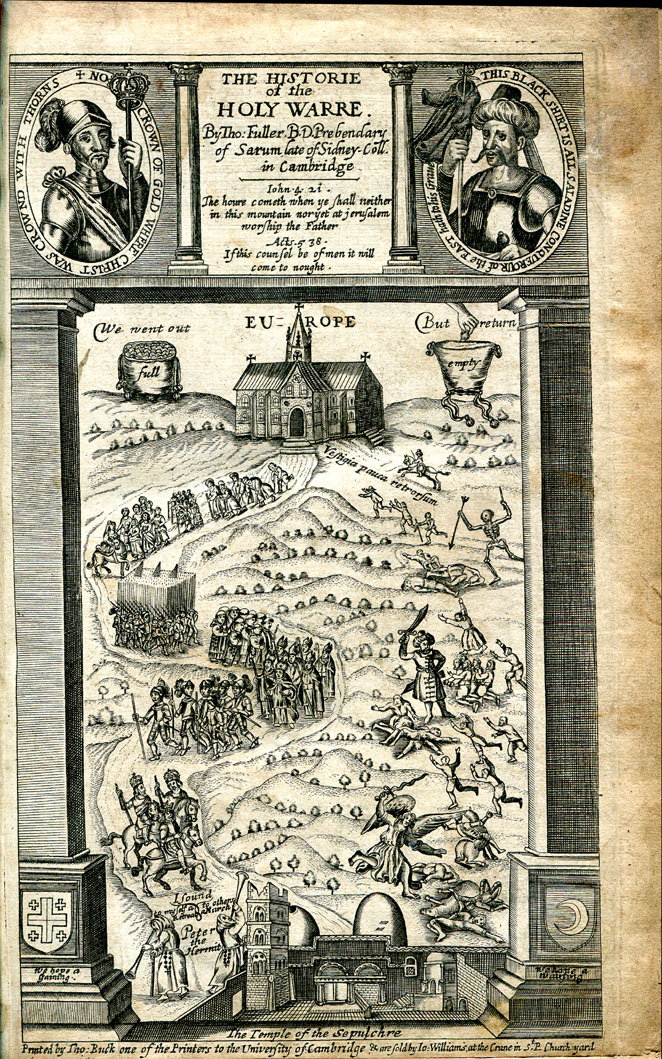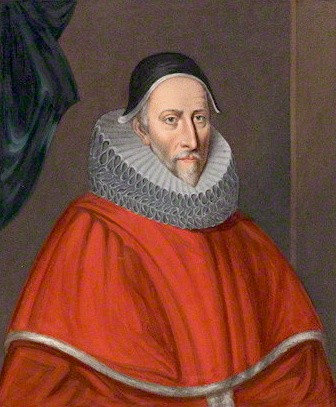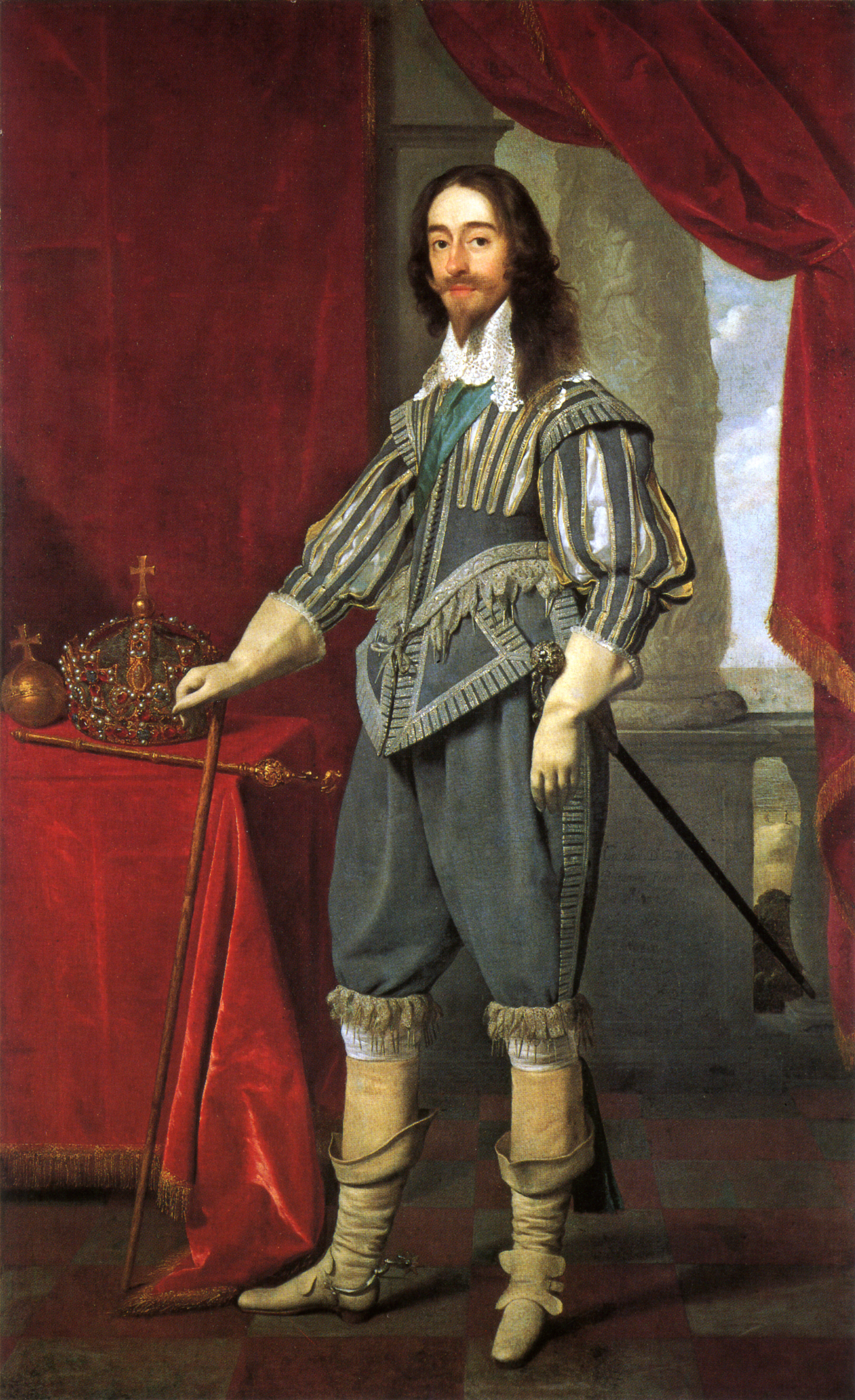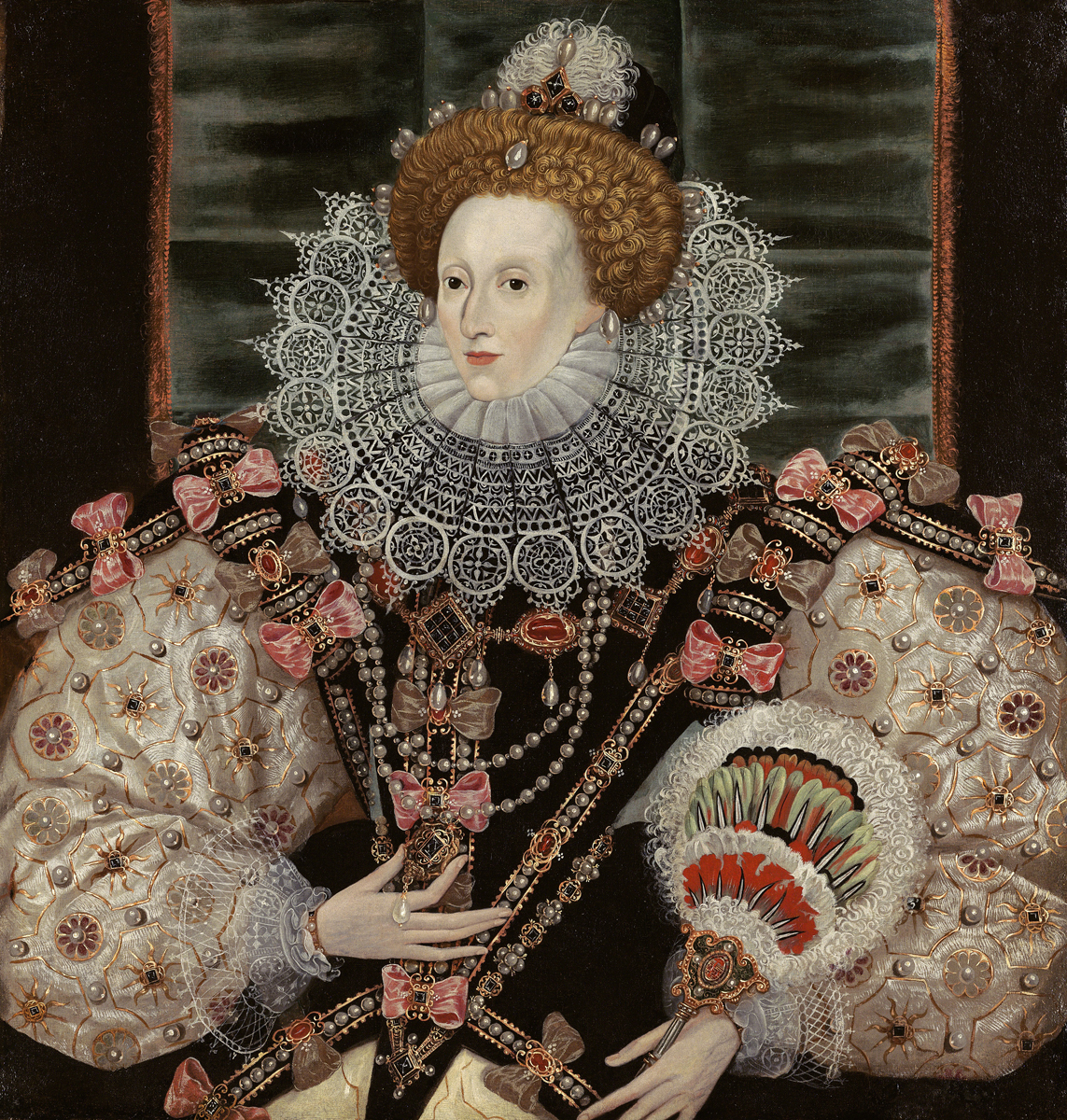|
Thomas Taylor (priest, 1576–1632)
Thomas Taylor (1576–1632) was an English cleric. A Calvinist, he held strong anti-Catholic views, and his career in the church had a long hiatus. He also attacked separatists, and wrote copiously, with the help of sympathetic patrons. He created a group of like-minded followers. Life Taylor was born in 1576 in Richmond, Yorkshire, where his father was known as a friend to Puritans and silenced ministers. He distinguished himself at Cambridge, became a fellow and reader in Hebrew at Christ's College, Cambridge, Christ's College. A follower of William Perkins (theologian), William Perkins, Taylor began preaching at 21 and when only about 25 preached a sermon at St. Paul's Cross before Elizabeth I of England, Queen Elizabeth. He was known for strong anti-Roman Catholic views. In a sermon delivered at St. Mary's, Cambridge, in 1608, Taylor denounced Archbishop Richard Bancroft's severe attitude towards Puritans. He was then silenced by Samuel Harsnet and threatened with degradat ... [...More Info...] [...Related Items...] OR: [Wikipedia] [Google] [Baidu] |
Thomas Taylor
Thomas Taylor may refer to: Military *Thomas H. Taylor (1825–1901), Confederate States Army colonel *Thomas Happer Taylor (1934–2017), U.S. Army officer; military historian and author; triathlete *Thomas Taylor (Medal of Honor) (born 1834), American Civil War sailor and Medal of Honor recipient *Thomas William Taylor (British Army officer) (1782–1854) Politicians *Sir Thomas Taylor, 2nd Baronet (1657–1696), English MP for Maidstone *Sir Thomas Taylor, 1st Baronet (1662–1736), Anglo-Irish MP *Sir Thomas Taylor, 2nd Baronet, of Kells (1686–1757), Anglo-Irish MP *Thomas Taylour, 1st Earl of Bective (1724–1795), Irish peer and politician *Thomas Edward Taylor (1811–1883), British Conservative Party politician *Thomas Taylor (Liberal politician) (1851–1916), British Liberal Party politician, MP for Bolton, 1912–1916 *Thomas William Taylor (1852–1924), politician in Manitoba, Canada *Thomas Baird Taylor (1860–1937), American farmer and politician in the Minnesota ... [...More Info...] [...Related Items...] OR: [Wikipedia] [Google] [Baidu] |
Funeral Sermon
A Christian funeral sermon is a formal religious oration or address given at a funeral ceremony, or sometimes a short time after, which may combine elements of eulogy with biographical comments and expository preaching. To qualify as a sermon, it should be based on a scriptural text. Historically such sermons were very often prepared for publication, and played a significant part in Lutheran, and later in Puritan, presbyterian, and nonconformist literary cultures, in Europe and New England. They also were and are common in Christian denominations generally. A trend in funeral sermons of the Renaissance and Reformation was a move away from the thematic sermon closely allied to scholasticism, towards an approach based on Renaissance humanism. In Spain, for example, the two were combined, the analytical and verbal style joined to humanist epideictic. While the contemporary assumption may be that a funeral sermon contains a significant element of life writing on the subject, in the pa ... [...More Info...] [...Related Items...] OR: [Wikipedia] [Google] [Baidu] |
Thomas Fuller
Thomas Fuller (baptised 19 June 1608 – 16 August 1661) was an English churchman and historian. He is now remembered for his writings, particularly his ''Worthies of England'', published in 1662, after his death. He was a prolific author, and one of the first English writers able to live by his pen (and his many patrons).Stephen, Leslie (1889). " Thomas Fuller". In ''Dictionary of National Biography''. 20. London. pp. 315-320. Early life Fuller was the eldest son of Thomas Fuller, rector of Aldwinkle St Peter's, Northamptonshire. He was born at his father's rectory and was baptised on 19 June 1608. Dr John Davenant, bishop of Salisbury, was his uncle and godfather. According to John Aubrey, Fuller was "a boy of pregnant wit". At thirteen he was admitted to Queens' College, Cambridge, then presided over by John Davenant. His cousin, Edward Davenant, was a tutor there. He did well academically; and in Lent 1624–1625 he became B.A. and in July 1628, at only 20 years of age ... [...More Info...] [...Related Items...] OR: [Wikipedia] [Google] [Baidu] |
Trevecca
Trefeca (also Trefecca, Trevecca, and Trevecka), located between Talgarth and Llangorse Lake in what is now south Powys in Wales, was the birthplace and home of the 18th-century Methodist leader Howell Harris (1714–1773), (). It was also the site of two Calvinistic Methodist colleges at different times; the first sponsored by Selina, Countess of Huntingdon, (an English Methodist leader) in the late-18th century; the second supported by the Welsh Calvinistic Methodist Church in the later 19th century. Teulu Trefeca In 1752, Harris, who was born in Trefeca and was one of the foremost leaders of the Welsh Methodist revival, established a Christian community there known as ''Teulu Trefeca'' ('the Trefeca Family'), modelled on the Moravian Herrnhutt community of Count von Zinzendorf. John Wesley preached for Harris's 'family' when visiting Trevecca in August 1769 for the first anniversary of Trevecca College. The additions to Harris's family house were in an unusual neo-Gothi ... [...More Info...] [...Related Items...] OR: [Wikipedia] [Google] [Baidu] |
Robert Harley (1579–1656)
Sir Robert Harley (baptised 1 March 1579 – 6 November 1656) was an England, English statesman who served as Master of the Mint for Charles I of England, Charles I. A devout Puritan, he supported Parliament of England, Parliament in the Wars of the Three Kingdoms. Life He was the son of Thomas Harley of Brampton Bryan Castle in Herefordshire and his wife Margaret, daughter of Sir Andrew Corbet (died 1578), Andrew Corbet. He entered Oriel College, Oxford in 1595, earning a BA in 1599. He entered Middle Temple in 1599. He was invested as a Knight of the Bath on 25 July 1603. After his first marriage in 1603, he served in various local offices in Herefordshire and Radnorshire, including representing Radnor (UK Parliament constituency), Radnor in Parliament of England, Parliament in 1604, Herefordshire (UK Parliament constituency), Herefordshire in 1624 and 1626 and Evesham (UK Parliament constituency), Evesham in 1628. In 1623 he had married Brilliana, Lady Harley, Brilliana, da ... [...More Info...] [...Related Items...] OR: [Wikipedia] [Google] [Baidu] |
Robert Towne (minister)
Robert Towne (born Robert Bertram Schwartz; November 23, 1934 – July 1, 2024) was an American screenwriter and director. He started writing films for Roger Corman, including ''The Tomb of Ligeia'' in 1964, and was later part of the New Hollywood wave of filmmaking. Towne wrote and won an Academy Award for Roman Polanski's ''Chinatown'' (1974); starring Jack Nicholson, widely considered one of the greatest screenplays ever written, as well as its sequel, ''The Two Jakes'' (1990). For Hal Ashby, he penned the comedy-dramas ''The Last Detail'' (1973) and ''Shampoo'' (1975). He collaborated with Tom Cruise on the films ''Days of Thunder'' (1990), ''The Firm'' (1993) and the first two installments of the '' Mission: Impossible'' franchise (1996, 2000). Towne directed the sports dramas ''Personal Best'' (1982) and ''Without Limits'' (1998), the crime thriller ''Tequila Sunrise'' (1988), and the romantic drama ''Ask the Dust'' (2006). Early life Towne was born Robert Bertram Schwart ... [...More Info...] [...Related Items...] OR: [Wikipedia] [Google] [Baidu] |
Antinomianism
Antinomianism ( [] 'against' and [] 'law') is any view which rejects laws or Legalism (theology), legalism and argues against moral, religious or social norms (), or is at least considered to do so. The term has both religious and secular meanings. In some Christian belief systems, an antinomian is one who takes the principle of salvation by faith and divine grace to the point of asserting that the saved are not bound to follow the moral law contained in the Ten Commandments. Christian antinomians believe that faith alone guarantees humans' eternal security in Heaven regardless of one's actions. The distinction between antinomian and other Christian takes on moral law is that antinomians believe that obedience to the law is motivated by an internal principle flowing from belief rather than from any external compulsion, devotion, or need. Antinomianism has been considered to teach that believers have a "license to sin" and that future sins do not require repentance. Johannes ... [...More Info...] [...Related Items...] OR: [Wikipedia] [Google] [Baidu] |
4th Parliament Of King James I
The 4th Parliament of King James I was the fourth and last Parliament of England of the reign of James I of England, summoned on 30 December 1623, sitting from 19 February 1624 to 29 May 1624, and thereafter kept out of session with repeated prorogations, it was dissolved on the death of the King on 27 March 1625.; ; The Speaker of the House of Commons was Sir Thomas Crewe, the member for Aylesbury. History The parliament was referred to as "''Fælix Parliamentum''" or the "Happy Parliament" by Sir Edward Coke. The three previous parliaments of James I had been a source of conflict and the King's opening address to the Commons commented on the "desire of all parties to forget past disagreements." However the parliamentary session was clouded by mutual suspicion and nearly every speech made tacit or explicit comments with reference to previous sessions. Charles, Prince of Wales and the Duke of Buckingham used the Parliament to aid their push for a war against Spain. Buckingham ... [...More Info...] [...Related Items...] OR: [Wikipedia] [Google] [Baidu] |
Josua Sand
Josua or Jozua is a male given name and a variation of the Hebrew name Yeshua. Notable people with this name include: * Josua Bühler (1895–1983), Swiss philatelist * Josua de Grave (1643–1712), Dutch draughtsman and painter * Josua Harrsch (1669–1719), German missionary * Josua Hoffalt (born 1984), French ballet dancer *Josua Järvinen (1871–1948), Finnish politician * Josua Koroibulu (born 1982), Fijian rugby league footballer *Josua Heschel Kuttner (–1878), Jewish Orthodox scholar and rabbi * Josua Lindahl (1844–1912), Swedish-American geologist and paleontologist *Josua Maaler (1529–1599), Swiss pastor and lexicographer *Josua Mateinaniu (), Fijian missionary *Josua Mejías (born 1997), Venezuelan footballer *Johann Josua Mosengel (1663–1731), German pipe organ builder *Jozua Naudé (other), several people *Josua Swanepoel (born 1983), South African cricketer *Josua Tuisova (born 1994), Fijian rugby union player *Josua Vakurunabili (born 1992), Fijian ru ... [...More Info...] [...Related Items...] OR: [Wikipedia] [Google] [Baidu] |
Spanish Match
The Spanish match was a proposed marriage between Prince Charles I of England, Charles, the son of King James VI & I of Kingdom of Scotland and Kingdom of England, England, and Infante, Infanta Maria Anna of Spain, the daughter of Philip III of Spain. Negotiations took place over the period 1614 to 1623, and during this time became closely related to aspects of British foreign and religious policy, before breaking down completely. The policy, unpopular with England's Protestant House of Commons of England, House of Commons, where the recent Anglo-Spanish War (1585–1604) had not been forgotten, was initiated during the embassy to England of Diego Sarmiento de Acuña, conde de Gondomar, who arrived in London in 1614 with the offer that Habsburg Spain, Spain would not interfere with James's troubled rule in Kingdom of Ireland, Ireland if James would restrain the English "privateers" in Spanish American waters. Further, he proposed a marriage alliance, offering a dowry of £500,00 ... [...More Info...] [...Related Items...] OR: [Wikipedia] [Google] [Baidu] |
Gunpowder Plot
The Gunpowder Plot of 1605, in earlier centuries often called the Gunpowder Treason Plot or the Jesuit Treason, was an unsuccessful attempted regicide against James VI and I, King James VI of Scotland and I of England by a group of English Catholics, English Roman Catholics, led by Robert Catesby, who considered their actions attempted tyrannicide and who sought regime change in England after decades of religious persecution. The plan was to blow up the House of Lords during the State Opening of Parliament on Tuesday 5 November 1605, as the prelude to a popular revolt in the English Midlands, Midlands during which King James's nine-year-old daughter, Elizabeth Stuart, Queen of Bohemia, Princess Elizabeth, was to be installed as the new head of state. Catesby is suspected by historians to have embarked on the scheme after hopes of greater religious tolerance under James VI and I, King James I had faded, leaving many English Catholics disappointed. His fellow conspirators were ... [...More Info...] [...Related Items...] OR: [Wikipedia] [Google] [Baidu] |
Francis Knollys (admiral)
Sir Francis Knollys (c. 1552 – 1648) of Reading Abbey, Berkshire was an English privateer and politician who sat in the House of Commons at various times between 1575 and 1648. Life Knollys was the 6th son of Sir Francis Knollys, of Greys Court in Oxfordshire and Reading Abbey, Reading, in Berkshire, and his wife, Catherine Carey and was generally known as Francis Knollys the younger. He attended Magdalen College, Oxford in and around 1564. He was a student of Gray's Inn in 1565. In December 1575 Knollys was elected Member of Parliament for Oxford following the death of Edward Knollys, and held the seat unit 1589. In those early years he was involved in piracy with Sir Francis Drake, serving as a rear-admiral on privateering activities in the Caribbean, returning in 1586 with considerable booty. He soon after served with his brother-in-law, the Earl of Leicester, in the Netherlands campaign and was knighted by him at Flushing on 7 December 1587. Knollys was once again elec ... [...More Info...] [...Related Items...] OR: [Wikipedia] [Google] [Baidu] |







